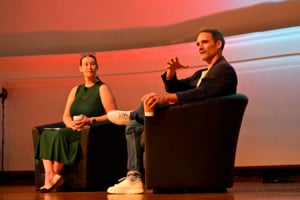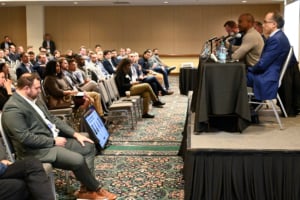ETA’s Global Momentum Takes Center Stage at Record-Breaking 12th Annual Booth–Kellogg Conference

More than 1,100 people attended the 12th Annual Booth–Kellogg Conference.
This week the Polsky Center, the ETA Group at Chicago Booth, and the Kellogg Innovation and Entrepreneurship Initiative hosted the 12th Annual Entrepreneurship Through Acquisition Conference, welcoming more than 1,100 attendees from across the world — the largest gathering in the event’s history. The day offered insights into the evolving ETA model, emerging global markets, and what it takes to succeed as a searcher in 2025 and beyond.
Keynote Highlights: The Global Expansion of ETA
The keynote conversation, moderated by Adjunct Assistant Professor of Entrepreneurship at Chicago Booth Catherine Littell, featured Rob LeBlanc, cofounder of Ambit Partners and one of the world’s leading search fund investors. LeBlanc shared a clear message: ETA is becoming a global movement, driven by demographic shifts and increasing awareness of the model outside the U.S.
He explained that many countries are now facing the same market indicators seen in the U.S. — notably aging business owners without succession plans — creating opportunities for entrepreneurship through acquisition. Exits and financing options abroad, once considered scarce, are also growing quickly as the model spreads.

Adjunct Assistant Professor of Entrepreneurship at Chicago Booth Catherine Littell and keynote Rob LeBlanc, cofounder of Ambit Partners.
“Search is happening in more than 40 countries now,” LeBlanc said. “The fundamentals that make ETA work in the U.S. also exist around the world.”
A major theme of LeBlanc’s remarks centered on how students can stand out as aspiring searchers.
He encouraged students to think deeply about whether ETA is a fit for them and to take ownership of their preparation by speaking with as many people in the field as possible, across each stage of the process; to take courses; attend conferences; and pursue internships and professional experience where possible.
“Your preparation is the loudest signal to investors,” he said. “How you prepare for the search tells them how you’ll show up as a CEO.”
For those on the fence about whether to pursue ETA in the United States or abroad, LeBlanc urged students to think personally before thinking commercially.
“Where do you want to build your life? Where do you want to raise a family?” he asked.
“While raising capital may be easier in the U.S., sourcing opportunities can be easier in less crowded international markets. With both options, you’re just putting risk and challenge at different parts of the funnel.”
Ultimately, he advised students to choose the location that aligns with their long-term goals — not just immediate convenience.
Workshop: Scaling Revenue in a Newly Acquired Business
One of the more practical sessions of the day came from the workshop Scaling Revenue in a Newly Acquired Business, led by Dustin Sellers, managing partner of Next Coast Legacy, and Charbel Zreik, managing principal of Manifestations Capital — two operators and investors with deep experience helping searchers grow newly acquired companies.
Sellers opened the session with a blunt reminder: organic growth is the backbone of ETA, and most acquired companies “won’t come with a functioning sales motion in place.” Buyers, he said, should expect to either build those capabilities themselves or hire someone who can.

The Scaling Revenue in a Newly Acquired Business workshop.
He shared a set of due-diligence questions that every buyer should be asking — especially around churn, true customer motivations, and competitive advantage — warning that owners “are good at selling, including selling you on the business.”
Zreik echoed Sellers’ comments on the importance of organic growth and framed the early days of ownership around identifying fuel that accelerates growth and bottlenecks that hinder it. Growth, he noted, might come through product development, improving the sales funnel, or recruiting — but identifying the right lever is essential.
“Your objective isn’t just sales or marketing; your objective is growth, no matter where that comes from,” he said.
Zreik and Sellers also addressed one of the biggest challenges new CEOs face: hiring and motivating salespeople.
Zreik noted that compensation should often be tailored to the individual and emphasized the importance of understanding decision-makers and customer types in the sales cycle before hiring.
“The best way to understand your sales cycle — and to ensure your hires perform well — is to sell yourself,” said Zreik.
Panel: Rollup and Consolidation Strategies
Another session focused on rollup and consolidation strategies, moderated by Brian Wolfe, managing partner of Funded Ventures and adjunct assistant professor of entrepreneurship at Chicago Booth, and featuring Brian Axelrad, partner at Kilpatrick Townsend & Stockton; Michael Kidd, consulting partner and director of transaction advisory at Mowery & Schoenfeld; Manvendra Saxena, founder and chairman of Mars Energy Group; and Katie Walker, principal at Plexus Capital.
While rollups are often talked about as an exciting path in ETA, the panelists urged students to approach them with realism and an understanding of what makes them work.
Saxena stressed that consolidations are complex and may not be the right choice for first-time CEOs.

The Rollup and Consolidation Strategies Panel.
“For searchers who have never done a deal before, it’s a tough ask,” he said. “Once you’ve been through it and know it’s a good fit for you, then you’ll have the confidence to pursue a programmatic strategy.”
Axelrad encouraged those in the audience to think carefully about whether they want to pursue a holding company or programmatic M&A structure.
“Search is a get-rich-slow game,” he said. “Holding companies are the epitome of that. You need to be intentional about whether you want to be in it for 7, 10, 12 years — maybe with no exit horizon.”
Because programmatic rollups require capital over a longer period, the panel noted that searchers must be upfront with investors.
Walker offered practical guidance on structuring debt for a multi-acquisition strategy.
“You owe it to yourself and your investors to be intentional from the start,” she said. “A strong, predictable base business is essential — that’s what lets lenders support you long-term.”
The panel agreed that post-acquisition integration is the real work — and often underestimated.
Kidd stressed that small inefficiencies multiply with each acquisition. “If you don’t have the right systems or the right people in place, it all falls on you,” he said. “You have to be honest about what the business can handle before layering on more.”
Saxena emphasized that cultural fit must be evaluated before an LOI is signed. “It’s not a post-integration issue,” he said. “We spent hours assessing values, personality types, and where people would fit. Culture isn’t an afterthought — it’s something you think about day-to-day.”
Walker added that operating systems like EOS can help standardize goals and processes across multiple companies. “If you get that right, it’s half the battle.”
Students often ask how to build a pipeline of bolt-on acquisitions. Saxena noted that being respected within the industry is key.
“We try to build a brand where sellers know we buy good companies and treat them well,” he said. “By the second call, I’m bringing in a past seller to vouch for us. That matters.”
Wolfe closed with a reminder to students:
“Find your own truth on this stuff. The market changes. Don’t act on stories — get granular, do your research, and figure things out for yourself.”
Trends, Challenges, and What’s Next in Search
The Trends, Challenges, and What’s Next in Search panel brought together Brian O’Connor, adjunct professor of entrepreneurship at Chicago Booth; Zach Duprey, executive vice president at Parkside Financial Bank; Jason Jackson, partner at Futaleufu Partners; and Raam Jani, partner at BakerHostetler, for a candid look at how ETA is evolving amid rising interest and record participation.
O’Connor opened by pointing to this year’s turnout as evidence that the ETA model is expanding rapidly. With more students, operators, and investors entering the space each year, he posed a question on the minds of many aspiring searchers: has the supply of quality targets kept pace with the growth in interest?

The Trends, Challenges, and What’s Next in Search Panel.
Jackson believes it has — but warned that the distribution of opportunity is uneven because searchers often crowd into the same sectors.
“People rush to the pond where they saw a big fish,” he said. “They see a big exit in software, and then all of a sudden everyone wants to be in software. Then deals stop getting done in that area. Not because opportunities vanished — but because everyone was chasing the same thing.”
Duprey said lenders see the same pattern firsthand. “It’s not uncommon for us to see the same deal come across our desk from multiple searchers bidding against each other,” he added.
On the legal side, Jani noted a rise in new search vehicles being formed — but also an increase in those being wound down. “It’s not that the opportunity isn’t there,” he said. “It’s that more people are trying this path without truly having an edge. The market is shifting, and we’re seeing different models emerge — multi-asset search funds, long-term hold vehicles — as part of that evolution.”
As more students enter ETA, the panelists stressed the importance of differentiation. O’Connor asked what aspiring searchers should focus on to truly stand out.
Jackson’s response was direct: “You have to show you understand what you’re getting into — the rejection, the grind, the uncertainty. And you need a thesis. A real one. Not a copy of what someone else did.”
Duprey agreed, adding that grit and focus are two of the strongest indicators of success. “The best searchers we work with know their market,” he said. “They put in the time, and that’s why they find deals.”
The panel encouraged students to be both ambitious and realistic about outcomes.
“Everyone thinks they’ll be the 10x outlier,” Jackson said. “But the data doesn’t support that. And that’s okay — you just have to go in with eyes open.”
Jani emphasized that even modest results create enormous professional upside.
“A 1x or 2x isn’t a failure,” he said. “You come out with experience, credibility, and opportunities you’d never have otherwise. Even a 0x isn’t the end — a lot of people who don’t acquire end up joining search-backed companies or staying active in the ecosystem.”
The panel closed with perspective for students considering ETA.
Jackson encouraged searchers to begin building their edge early — through outreach, developing a thesis, and showing they can operate in industries with manageable complexity.
“Most of our recent deals were proprietary, meaning that the searchers brought them to us,” he noted. “That means they were out doing the work; being creative and scrappy matters.”